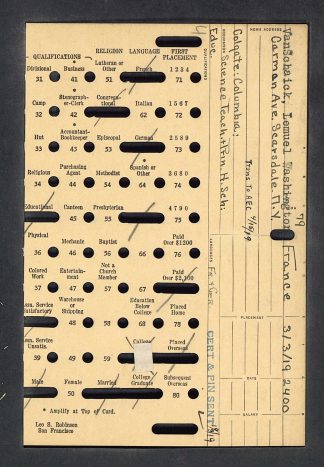By Suzy Frisch
Before the United States even entered World War I, the YMCA was deeply involved in supporting Allied forces and prisoners of war. The organization ultimately took on nearly all human service activities for the U.S. military during the rest of the conflict, stepping up hours after President Woodrow Wilson declared American involvement.
In all, 25,926 men and women served with the YMCA — in the United States and globally — caring for the mental, spiritual, and physical needs of the troops. Each person had a punch card laden with data, including name, gender, age, marital status, and more. A potential treasure trove for researchers, the cards had not been aggregated for big-picture data mining. The job was too daunting.
Ryan Bean, reference and outreach archivist for the University of Minnesota Libraries Kautz Family YMCA Archives, knew of Zooniverse, a crowdsourcing research platform with strong connections to the University. He believed its participants would make quick work of processing the cards so that researchers, historians, genealogists, and others could learn from their collective data.
“We were realizing that this would be a great potential resource for the right scholars if they could manipulate this data,” says Bean. “This is a really great pool of information about individuals during a time period we don’t necessarily know a lot about. We want to be able to expose that.”
Bean reached out to Lucy Fortson, University of Minnesota Zooniverse director, to see if the Decoding Punch Cards project would be a good fit for the platform. She agreed that it was, with its potential to provide insight into a massive amount of text-based data in the humanities and expand Zooniverse’s repertoire. When it’s complete, the project will serve as a model for other research involving punch cards.
How Zooniverse works
Harboring the philosophy that many hands make light work, Zooniverse encourages volunteers to engage with its research projects, says Fortson, a professor of physics and astronomy and Zooniverse co-founder. She helped launch the platform in 2007 to coalesce the power of the people to classify distant galaxies and understand galaxy evolution.
“We have found that people are keen to help with research,” Fortson says. “The public is able to participate in what researchers are doing, and they have made discoveries on their own like planets in other solar systems and female scientists working in the 1800s.”
For the WWI project, participants go to Zooniverse.org to view and classify individuals’ punch cards—essentially mini human resources files. Information includes their address, religion, languages spoken, skills like stenography or entertainment, education level, and where they served.
Nearly 1,600 online volunteers and counting
Tasking researchers at the YMCA Archive with processing nearly 26,000 cards just wasn’t tenable, and it just wasn’t happening. But since the project went live this fall, nearly 1,600 Zooniverse volunteers have completed 62,000 classifications. At this pace—and if people stay engaged in the project—it could be completed in six months or less, Bean notes.
When the punch cards are decoded, the YMCA Archives plans to share all of the raw and collated data with scholars, students, and the public. Staff also will create a database for people to look up punch cards by any data point.
“What’s striking is how engaged these mystery [Zooniverse] people on the Internet are. They are active and asking insightful questions and taking the effort to look up names to see if there is an important link to them,” Bean says. “In the process, they are helping me construct the narrative of why this data is important.”





